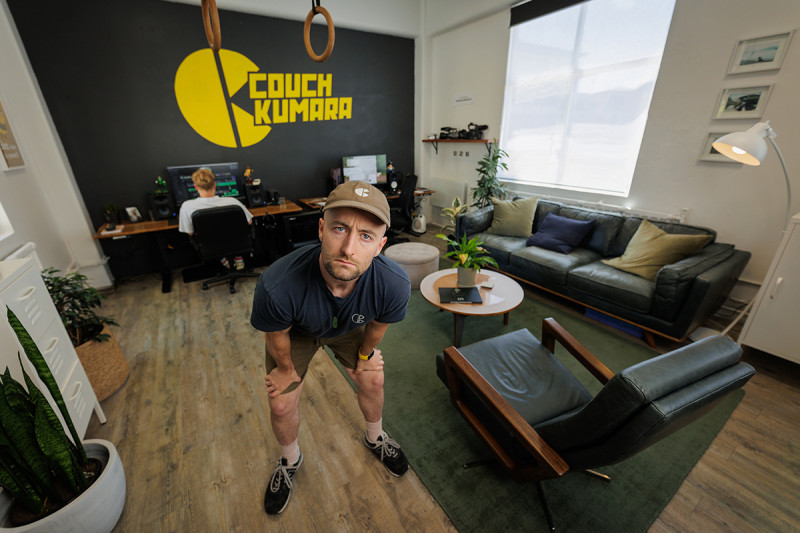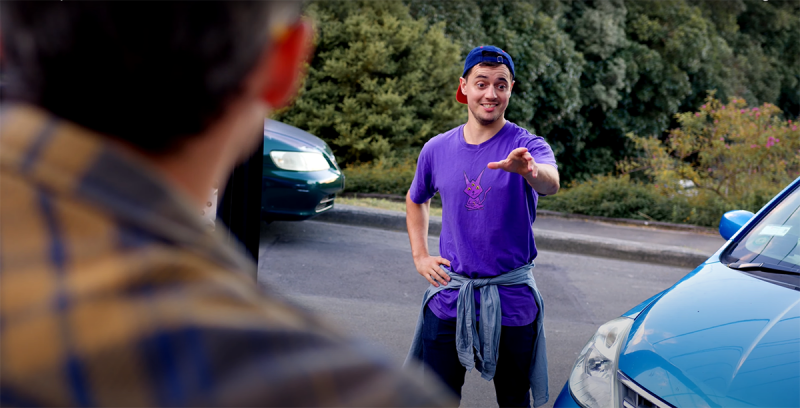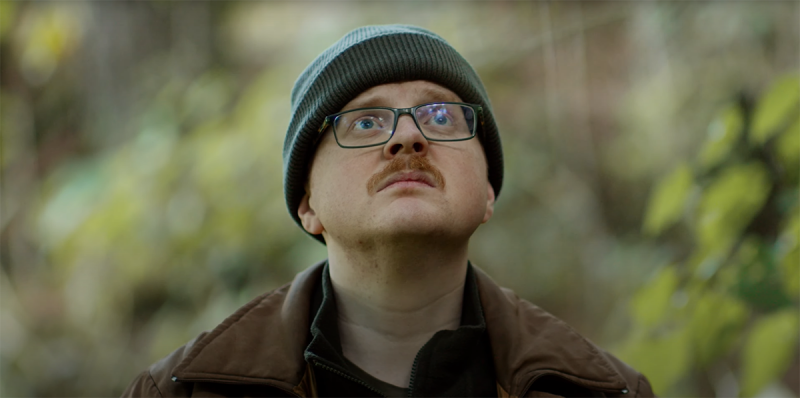
Finn O'Connor

Still from You Stole My Park

Still from Kiwiatus Gigantus
Wellington Silver Screeners: Finn O’Connor by Alessia Belsito-Riera
In our Wellington Silver Screeners series, Alessia Belsito-Riera shines a spotlight on the movers and shakers working in the film capital of New Zealand.
Chaotic, observational sketch comedy group and video production company Couch Kumara is one of New Zealand’s funniest three-person, two-dog teams of filmmaking creatives. Finn O’Connor, Ben Gregory, Colin (border collie one), and Banana (border collie two) are based right here in the heart of Wellington. Their day to day varies a lot – from making spontaneous YouTube skits to meticulously crafted commercials for top companies – but they thrive on the ever-changing environment, seizing each moment as inspiration. I stopped by the office to chat with director Finn (and stars Colin and Banana) and get the inside scoop on life at Couch Kumara.
What sparked your interest in storytelling and filmmaking?
In intermediate I had a friend who I would make little videos with because he had a camera. It was an old VHS camera with a black-and-white viewfinder, and we could only get the footage off it once every few months when he would go to his grandparents’ place where they could plug in the firewire cable. We would just muck around, write a lot of weird little comedy stories that we would read out to our intermediate class. We would pick up the camera on weekends and just go wild.
I think it was just loving the act of getting together with friends and spending time being creative as a group. I don’t think it was ever a personal desire to tell stories. I don’t think I necessarily have any important stories to tell the universe.
Can you tell me about your sketch comedy?
We’ve fallen into this comedy realm because it’s conducive to a group environment for collaboration and we enjoy it. It’s light-hearted, and there is liberty to it. You can go out at the weekend and just have fun with it. If it’s crap and you don’t make anything, it’s no loss because you’ve had fun making it. We’ve carried that philosophy through since high school. We’ve never been concerned with view counts and comments because we always knew our comedy style was quite niche.
With the tide shifting more towards short-form content, the whole landscape of filmmaking has changed dramatically, but I don’t think our intention has changed that much. We still make the videos for our own fun. In recent years we’ve been able to bring on mates into our commercial ads as actors and that’s really cool, as is moving towards using our comedy style that we’ve crafted in our skits in our commercial work. People are hiring us to make ads that are in our own style. I kind of consider the commercial work as paid practice for my creative filmmaking.
How did you get into the film industry?
It was a slow process! I finished uni in 2015. I was doing a computer science degree and the entire time I was like, ‘I don’t want to do it as a job’. I had been making music videos and had gotten the odd corporate job and also did some videos for Oil Free Wellington while I was studying. I slowly built up more people who I knew in the arts industry, so by the time I finished uni, I was able to do filmmaking part-time and website development part-time until over the next year and a half I moved into entirely filmmaking. I also think I was in it at a good time. 2015 was when video production and social media were getting to the point where you could turn it into a job. If I was five years earlier, I think I’d have found it really hard to have gotten where I am today.
How do you find Wellington’s film industry?
I think Wellington has a really nice, relaxed, and collaborative feel. The people I’ve met have always been super lovely and also really keen to collaborate. Other places can feel quite competitive and a bit like a rat race, trying to make as much money as possible. [In Wellington,] people aren’t necessarily only relying on NZ On Air, the New Zealand Film Commission, or the traditional routes – they make stuff off their own dollar, just for the fun of it. I would love to work with more people.
Can you tell me about the journey of creating Couch Kumara?
It was very organic and very slow. I always knew I wanted to make videos, the capacity and style of the videos just changed throughout the years. Everyone has that dream as a kid to make a feature film, but over the years my goals have changed. Now I want to have a sustainable career in video production. I don’t try to grow it too quickly because I don’t want to be a business owner, I don’t want to be a manager, I want to be making videos. On the other hand, I also want to pursue the creative side. If they can at some point slowly converge, that would be the greatest option. The dream is that you can come up with a concept, get funding, and make it with no creative compromises. I can see the two powers that were once parallel slowly coming together, but it’s not really by design. It’s from making videos that are true to our style over the last 10 years or so, being consistent with it, and not really compromising too much on what we enjoy making, what we find funny, and what we engage with.
What does an average day at Couch Kumara look like?
An average day is the two of us in the office editing commercials and occasionally doing the odd skit. On Wednesdays, we like to meet up and do devising sessions with mates. We’re about to go out to Waikanae to pick up a bright yellow branded van. The days are pretty varied. Last week, we did a five-day TV commercial shoot that was very full on and then this week is completely different. I painted the wall the other day. It goes from really heavy on-set commercial work to more organic, creative, slow-moving work. And then occasionally we have edits to do and they’re not particularly creative so we’re just slogging through. It’s maintaining that balance of creativity and putting your head down.
What’s your favourite part of the process?
Production. Pre-production has never been our strong suit. It’s something we’re trying to get better at. We know the value of it, but we come up with concepts super quick and go into making them and figure out what’s funny on the spot. We still need to do a shot list and write scripts and stuff for clients to see, but we also really like maintaining that flexibility, so if we find ourselves onsite and something isn’t working, we have the option to try something else. Otherwise, it’s just too rigid. So being on set is my favourite part, when everyone is laughing and having a good time.
What projects do you have on the horizon?
We have a big project coming up that is in collaboration with quite a large comedy group based in Auckland. It’s a short YouTube series based on property managers. We’ve already done a couple of skits on property managers, and we did say at the time that we intended to do a series. There is a lot of meat there and a lot of people are struggling right now in the rental market.
What’s something that you’ve always wanted to create?
Well, it’s kind of this project coming up. We think the concept is pretty strong and it’s in our wheelhouse. The collaborative aspect of it is a bit of an unknown because it’s going to be quite a split using their cast as well as ours, but that is actually what I’m most looking forward to. I always wanted to make a feature, but the older I get, the more I understand myself, and the more I know I flit from one thing to another. I really do admire those who have the stickability to do it because it’s not easy. That was my dream, but now I think a funded, proper series would be way cooler.
I think what I would like to be part of is reshaping that New Zealand style, or at least just helping to expand it – pulling away from the lovable idiot into something slightly more nuanced. Jemaine Clement and Taika Waititi’s writing is incredible, but I think it’s their style. It’s not necessarily the New Zealand style.
What advice would you give to someone trying to get into filmmaking?
First of all, make friends. Going at it solo is very hard. You need people who you get along with to help you. Get a camera, make friends, and don’t wait for the opportunity to come to you. Just start making stuff and don’t be too caught up on making it perfect because that will hamstring you. If you’re too worried about what you’re releasing being a perfect piece of cinema and art, it will never get made. There is too much time spent on the theory of stuff. You develop a theory later; you’ll make mistakes, learn what doesn’t work, and the same goes when you do something good.
How are Couch Kumara mascots Banana and Colin’s careers looking?
They are the alarm system. They are so excited every day to come in. They love their job. Their careers are well on their way. I’ll probably represent them for now, but they may seek external representation at some point. My cut may be too much. I house them and feed them, so they have to earn their wage, which they do in sleeping and being cute… and barking.
Colin: Woof!
[Editor’s note: Colin did indeed bark right on cue.]
View more articles from:
« Issue 212, January 30, 2024

